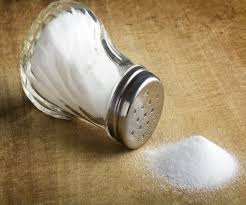- Home
- Editorial
- News
- Practice Guidelines
- Anesthesiology Guidelines
- Cancer Guidelines
- Cardiac Sciences Guidelines
- Critical Care Guidelines
- Dentistry Guidelines
- Dermatology Guidelines
- Diabetes and Endo Guidelines
- Diagnostics Guidelines
- ENT Guidelines
- Featured Practice Guidelines
- Gastroenterology Guidelines
- Geriatrics Guidelines
- Medicine Guidelines
- Nephrology Guidelines
- Neurosciences Guidelines
- Obs and Gynae Guidelines
- Ophthalmology Guidelines
- Orthopaedics Guidelines
- Paediatrics Guidelines
- Psychiatry Guidelines
- Pulmonology Guidelines
- Radiology Guidelines
- Surgery Guidelines
- Urology Guidelines
Increased salt intake leads to increased risk of death

The researchers from Brigham and Women's Hospital have found that there is a direct linear relationship between increased salt intake and increased risk of death.
Eating foods high in salt is known to contribute to high blood pressure, but does that linear relationship extend to increased risk of cardiovascular disease and death was investigated by researchers by using multiple measurements. Various studies have contested that relationship but that is due to an inaccurate way of estimating sodium intake which may help account for the paradoxical findings of others, Authors feel. The study has been published in International Journal of Epidemiology.
Strong evidence indicates that reduction of salt intake lowers blood pressure and reduces the risk of cardiovascular disease (CVD). The WHO has set a global target of reducing the population salt intake from the current level of approximately 10 g daily to <5 g daily.
Please also read
Salty Debate: What are ideal sodium Targets in Hypertension ??
https://speciality.medicaldialogues.in/wpadmin/post.php?post=79032&action=edit
"Sodium is notoriously hard to measure," said Nancy Cook, ScD, a biostatistician in the Department of Medicine at BWH. "Sodium is hidden - you often don't know how much of it you're eating, which makes it hard to estimate how much a person has consumed from a dietary questionnaire. Sodium excretions are the best measure, but there are many ways of collecting those. In our work, we used multiple measures to get a more accurate picture."
Measuring Sodium intake by using a spot test to determine how much salt has been excreted in a person's urine sample can fluctuate throughout the day. Therefore an accurate measure of a person's sodium intake on a given day requires a full 24-hour sample. In addition to this, the best way to get a full picture of sodium intake is to take samples on multiple days.
In the present study, the researchers assessed sodium intake in multiple ways, including estimates based on that formula as well as ones based on the gold-standard method, which uses the average of multiple, non-consecutive urine samples. They assessed results for participants in the Trials of Hypertension Prevention, which included nearly 3,000 individuals with pre-hypertension.
The gold-standard method showed a direct linear relationship between increased sodium intake and increased risk of death. The team found that the Kawasaki formula suggested a J-shaped curve, which would imply that both low levels and high levels of sodium consumption were associated with increased mortality.
"Our findings indicate that inaccurate measurement of sodium intake could be an important contributor to the paradoxical J-shaped findings reported in some cohort studies. Epidemiological studies should not associate health outcomes with unreliable estimates of sodium intake," the authors wrote.
The conflicting results of previous studies can be explained by the premise that they have used spot samples and the Kawasaki formula.

Disclaimer: This site is primarily intended for healthcare professionals. Any content/information on this website does not replace the advice of medical and/or health professionals and should not be construed as medical/diagnostic advice/endorsement or prescription. Use of this site is subject to our terms of use, privacy policy, advertisement policy. © 2020 Minerva Medical Treatment Pvt Ltd